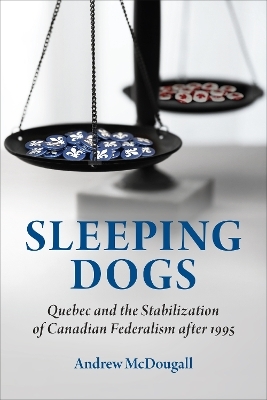
Sleeping Dogs
Quebec and the Stabilization of Canadian Federalism after 1995
Seiten
2023
University of Toronto Press (Verlag)
978-1-4875-0298-0 (ISBN)
University of Toronto Press (Verlag)
978-1-4875-0298-0 (ISBN)
This book sheds light on the decline of the Quebec sovereignty movement after the 1995 referendum, offering a fresh perspective on competing explanations.
What happened to the Quebec sovereignty movement after 1995? In Sleeping Dogs, Andrew McDougall reveals how a change in federalist strategy, combined with an improving political context, helped Canada stabilize its federal system and bury the "Quebec question" for the foreseeable future.
The book identifies five potential reasons the Quebec sovereignty movement lost momentum and argues that all contributed to a political environment that benefited federalists. McDougall explores topics of elite accommodation, generational change, changing identity politics, economic globalization, and constitutional fatigue. He argues that Canada’s federalist political elites have capitalized on these developments to stabilize the country by dropping the national question – even when they might still hold very different visions of the Constitution. Building on "constitutional abeyance" theory, the author conceives of this strategic change as the restoration of a constitutional abeyance among federalist actors. Considering recent history in light of subsequent developments, Sleeping Dogs is a timely and important attempt to understand the evolving situation in Quebec and Canadian federalism.
What happened to the Quebec sovereignty movement after 1995? In Sleeping Dogs, Andrew McDougall reveals how a change in federalist strategy, combined with an improving political context, helped Canada stabilize its federal system and bury the "Quebec question" for the foreseeable future.
The book identifies five potential reasons the Quebec sovereignty movement lost momentum and argues that all contributed to a political environment that benefited federalists. McDougall explores topics of elite accommodation, generational change, changing identity politics, economic globalization, and constitutional fatigue. He argues that Canada’s federalist political elites have capitalized on these developments to stabilize the country by dropping the national question – even when they might still hold very different visions of the Constitution. Building on "constitutional abeyance" theory, the author conceives of this strategic change as the restoration of a constitutional abeyance among federalist actors. Considering recent history in light of subsequent developments, Sleeping Dogs is a timely and important attempt to understand the evolving situation in Quebec and Canadian federalism.
Andrew McDougall is an assistant professor of Canadian politics at the University of Toronto Scarborough.
1. Introduction
2. An Abeyance Restored: The “Quebec Question” as the New Taboo
3. Constitutional Fatigue
4. Non-constitutional Accommodation
5. Quebec’s Changing Identity Politics
6. Generational Change
7. Economic Globalization
8. Conclusion
Notes
Bibliography
Index
| Erscheinungsdatum | 01.11.2023 |
|---|---|
| Reihe/Serie | Political Development: Comparative Perspectives |
| Verlagsort | Toronto |
| Sprache | englisch |
| Maße | 159 x 235 mm |
| Gewicht | 400 g |
| Themenwelt | Sozialwissenschaften ► Politik / Verwaltung ► Politische Systeme |
| Sozialwissenschaften ► Politik / Verwaltung ► Staat / Verwaltung | |
| Sozialwissenschaften ► Soziologie | |
| ISBN-10 | 1-4875-0298-2 / 1487502982 |
| ISBN-13 | 978-1-4875-0298-0 / 9781487502980 |
| Zustand | Neuware |
| Informationen gemäß Produktsicherheitsverordnung (GPSR) | |
| Haben Sie eine Frage zum Produkt? |
Mehr entdecken
aus dem Bereich
aus dem Bereich
wie ich versuchte, Italienerin zu werden
Buch | Hardcover (2024)
Droemer (Verlag)
23,00 €


